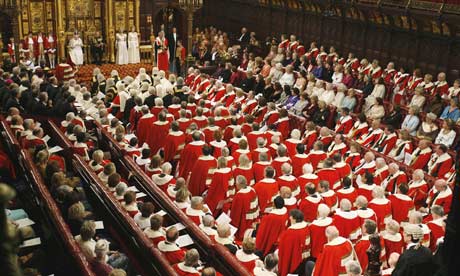
Jack Straw wants an upper house of 300 members elected by proportional representation serving for up to 15 years. Photograph: Stephen Lock/AP
Jack Straw's detailed blueprint for a 300- strong, wholly elected upper chamber to replace the Lords appears to have been blocked at the last minute following resistance in cabinet. The justice secretary had been planning to publish detailed draft clauses next week in line with a commitment in the Queen's Speech. But the plan met opposition in cabinet yesterday.
The resistance has been led by Lord Mandelson, the business secretary, who said he wanted to delay any commitments until the Labour manifesto is published. But some cabinet sources said they believed he opposed a fully elected second chamber in principle. It is known he has specific, detailed concerns, including the role of the bishops in any wholly elected house. Straw has proposed that bishops, as symbols of the established church, have speaking rights but no right to vote.
A further meeting is likely to held next week to see if the draft clauses can be rescued. Some supporters of reform believe the issue is not dead yet.
Straw had proposed an upper chamber of 300 senators who would be elected by proportional representation for a maximum term of 15 years.
Mandelson, as director of election strategy, has great power over how the government handles all policy announcements.
Reformers did little to disguise their frustration at the surprise turn of events. It looks increasingly like the party will not publish a detailed blueprint before the election manifesto.
The dispute between Mandelson and Straw could prove difficult for the prime minister to manage since the two men are both leading figures in the party.
The draft clauses also contain detailed proposals for the powers of the second chamber as a revising body subordinate to the powers of the Commons.
It was expected that the bishops would have to leave the upper chamber as part of the modernisation plan.
One source said the complexities of Lords reform is not an issue that drives votes. But advocates of Straw's reform package insist abolition of the peerage is a vote-winner, will be seen as part of the renewal of Britain, will win over a key middle-class constituency, and is a popular issue inside the party.
There were also suggestions that Mandelson's opposition stemmed from his fear that he will be left without a political platform if the Lords is abolished.
But critics of the proposals in the cabinet expressed concern both about the details, and whether this was an issue on which the party needed to focus in the run-up to the election. There are concerns that if bishops are excluded from the upper house, it will prove difficult to continue to allow the Church of England to remain the established church.
Labour business managers in both the Commons and Lords have warned about the timing, suggesting next week's publication of the proposals ending 800 years of history might make peers less co-operative in the trading that lies ahead over the government's legislative programme. Government whips in both houses have to reach deals on which parts of the government programme, bill by bill, can reach the statute book before the prorogation of parliament and the election.